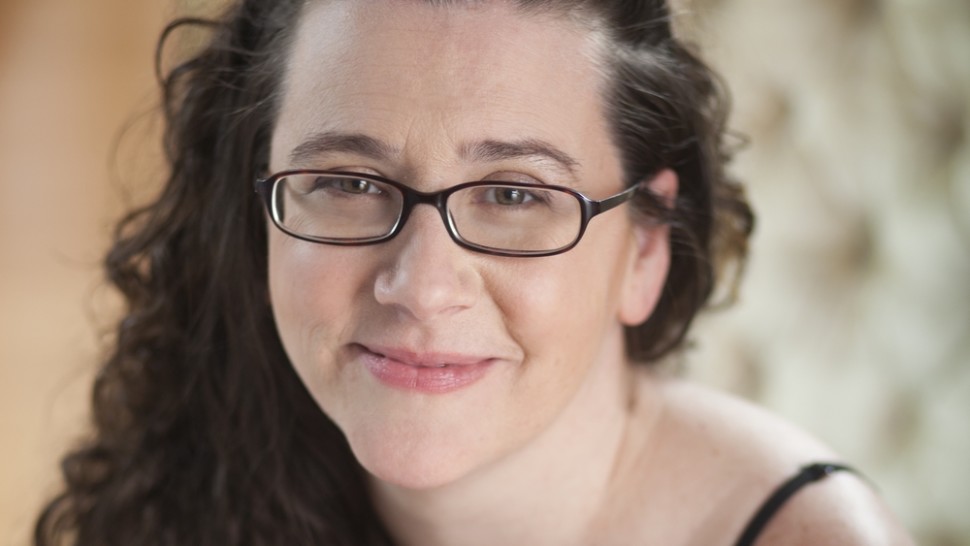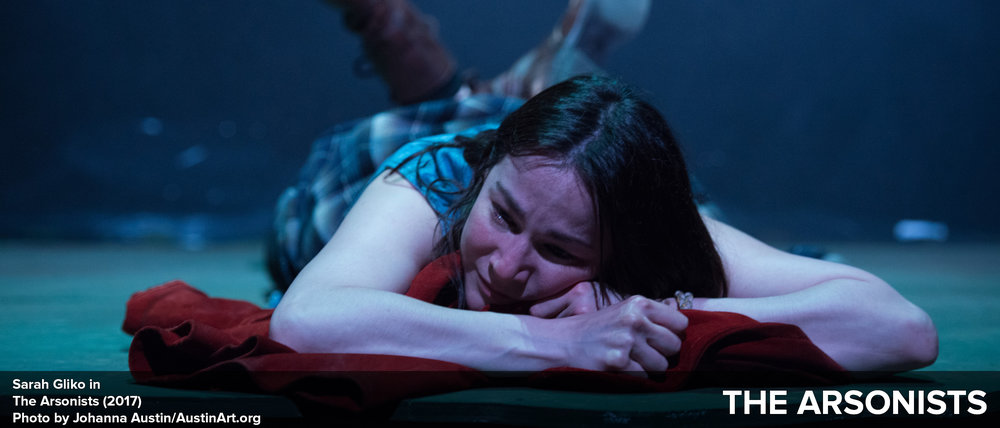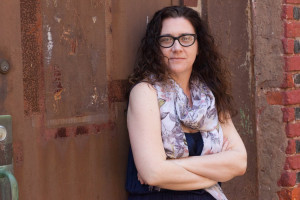 It’s been a banner month for local playwright Jacqueline Goldfinger. On May 5, judge Nicholas Wright selected Goldfinger’s Bottle Fly as winner of the 2017 Yale Drama Series Prize, which carries an honorarium of $10,000 and a guarantee of publication by Yale University Press. Bottle Fly will further receive a staged reading in London later this year in conjunction with the prize. Days later, Azuka Theatre’s production of Goldfinger’s The Arsonists opened to rapturous reviews. “Haunting and atmospheric” wrote Phindie.com contributor Toby Zinman, writing in the Inquirer; Philadelphia magazine’s David Fox called it “a brilliant way to close the season.” The Arsonists closes on Sunday, after which it will travel to Ohio, Alaska, and California as part of the National New Play Network’s Rolling World Premieres Program.
It’s been a banner month for local playwright Jacqueline Goldfinger. On May 5, judge Nicholas Wright selected Goldfinger’s Bottle Fly as winner of the 2017 Yale Drama Series Prize, which carries an honorarium of $10,000 and a guarantee of publication by Yale University Press. Bottle Fly will further receive a staged reading in London later this year in conjunction with the prize. Days later, Azuka Theatre’s production of Goldfinger’s The Arsonists opened to rapturous reviews. “Haunting and atmospheric” wrote Phindie.com contributor Toby Zinman, writing in the Inquirer; Philadelphia magazine’s David Fox called it “a brilliant way to close the season.” The Arsonists closes on Sunday, after which it will travel to Ohio, Alaska, and California as part of the National New Play Network’s Rolling World Premieres Program.
Jackie graciously took some time away from her Mother’s Day festivities to talk to me about her recent windfall, her passion for making theater accessible to all, and her work helping young Philadelphia playwrights develop and refine their talents. These are edited excerpts.
 Cameron Kelsall: First of all, congratulations on winning the Yale Drama Series Prize! How did you learn you’d won?
Cameron Kelsall: First of all, congratulations on winning the Yale Drama Series Prize! How did you learn you’d won?
Jacqueline Goldfinger: I was actually in the middle of my day job, and I was expecting a call from someone else—so when I picked up the phone it was a double surprise! John [Donatich], who is the head of Yale University Press, called to let me know, and it was just so overwhelming I was actually silent for a moment. He thought we lost the connection! When you get news like that, it’s exciting, overwhelming, and a little shocking. And since then, I’ve gotten a chance to talk with Nicholas Wright from the National Theatre, who was the head of the committee, to talk about the play. That’s not only been an honor, but incredibly useful artistically.
CK: And the National Theatre is where the play is going to have its London reading. Will you be involved in that?
JG: I will. I get to go out to London in November for the reading, and I am going to try and extend my trip by another week to travel around, meet a lot of people, see a lot of theater. I figure if I’m there, I might as well. I have always wanted to get up to see the Traverse Theatre in Scotland and to get to Edinburgh, so it will give me a chance and the resources to explore the UK theater scene.
CK: Both Bottle Fly and The Arsonists are both very much rooted in place. Do you think of yourself as a playwright of place?
JG: The idea of place is incredibly important to me, because in theater you’re there, it’s live—you are very much immersed in the place. Creating that strong, compelling, and engaging sense of place in the language of my plays is a very large part of creating the atmosphere of the world. I think we do need to create the world in theater more than we have to in other literatures, because with fiction you’re sitting at home, and you can imagine the ins and outs of a world if you like. In theater, because we are coming together at a specific time and a specific location to tell a particular story, it is really important that the world is a strong part of the play. That’s true even if it takes place on the moon!
CK: Who were the playwrights who inspired that attitude in your writing?
JG: Sam Shepard does a great job of creating place, even in some of his earlier works which can be really out there. Enda Walsh does a phenomenal job, and Caryl Churchill is another one. And August Wilson, because you could not tell his stories in any other place than where he sets them. It is that vital to the story he’s telling. We have a tremendous history in America of evocating place in a strong and specific way, and since I grew up reading a lot of traditionally American stories, I think that filtered through.
CK: Speaking of inspiration, you used Electra as the starting point for The Arsonists. Was that always a text you wanted to work with?
JG: It was not a text I always wanted to work with. Of the Greek tragedies, it was never the one that truly popped for me, until after I had kids. But after I had kids, I was teaching the Frank McGuinness adaptation of Electra, and all of a sudden the relationship between Electra and Agamemnon became so much more dimensional and vital. I initially thought of doing more of a straight adaptation, but the fact is that there are plenty of straightforward adaptations of that play. So I started thinking about what other ideas I had in the pot, and what might fit together. The idea of a father/daughter arson team was one I’d had for a while, but I didn’t know what to do with it. When I stuck Electra to it, it started to have some heat. It started to make some sense, because the relationship between the father and daughter is likely very private, very intense, and very dangerous. They would be likely to lose each other. I don’t always know why certain ideas start to group together, but they do. There is a magnetism that just starts to click into place.
CK: The production is part of Azuka’s first “pay what you decide” season. Was it important for you to be a part of this undertaking?
JG: I am over the moon about pay what you decide, because I believe in art for all. Art should not be limited by financial resources, or region, or anything else. As someone who could not afford to go to theater when they were young, making art accessible has been very important to me, and is something I do as part of my practice. And I am thrilled to see that it is paying off. If you go to an Azuka show, the audiences are exactly the type that every theater in the country is looking for: diverse in age, race, gender identity, ethnicity. It is very clear that if you tell engaging contemporary stories, a range of people will come to the theater, and there will be really exciting discussions afterwards. There is that interest. Theater is not dying! But we have created unsustainable models in this country and institutions that feel far away from the people, rather than vital.
I think there are other factors at play beyond simply finances, too. Azuka is also not afraid to produce plays that are challenging. They are willing to look at contemporary topics that might be considered too dangerous or taboo for other theaters. They invite their audiences in, and there is no feeling of having to belong to a certain class, or to wear a certain outfit, to feel welcomed. It feels like a truly contemporary theater that is alive and evolving. Those elements, added to the removal of financial barriers, has really made the program soar, and I am thrilled to be a part of it.
CK: What do you think makes Philadelphia hospitable to its local playwrights?
JG: We are a city that has tremendous cultural resources and tremendous communities of collaboration, but it is also still affordable to live here. Unlike LA or New York or Chicago, artists can come here, maybe get a part-time job, and still have time to make their art. In other cities, as economics have changed, artists are working multiple jobs to pay the rent…and that can cause them to stop making art.
 I also think that we’ve always had a community of fantastic playwrights, but that in the past they haven’t been offered developmental resources. PlayPenn is clearly a tremendously successful program, but since it is both local and national, there are only a few local playwrights who had access to them. So one of the reasons that Michael Hollinger, Quinn Eli, and I started The Foundry five years ago was because we were all teaching in the community, and we were losing our best local playwrights to other cities because of the fact that there were just no resources between successful college or Fringe productions, and a second or third successful production. So we had this big gap, and playwrights were falling through that gap and moving as a result. The Foundry provides access to workshops and partnerships with theaters, and offers local playwrights the chance to develop their work in a professional environment. PlayPenn recently absorbed The Foundry, so now we have access to those national resources to provide to our playwrights.
I also think that we’ve always had a community of fantastic playwrights, but that in the past they haven’t been offered developmental resources. PlayPenn is clearly a tremendously successful program, but since it is both local and national, there are only a few local playwrights who had access to them. So one of the reasons that Michael Hollinger, Quinn Eli, and I started The Foundry five years ago was because we were all teaching in the community, and we were losing our best local playwrights to other cities because of the fact that there were just no resources between successful college or Fringe productions, and a second or third successful production. So we had this big gap, and playwrights were falling through that gap and moving as a result. The Foundry provides access to workshops and partnerships with theaters, and offers local playwrights the chance to develop their work in a professional environment. PlayPenn recently absorbed The Foundry, so now we have access to those national resources to provide to our playwrights.
Almost all of the new works you see in Philadelphia have been touched by The Foundry in some way. Orbiter 3 grew out of The Foundry, and we helped them get on their feet. Almost every new play you see on stage by a playwright under the age of 40 comes out of The Foundry. And because we rotate playwrights in three-year stints, we get to focus on more than just one play with each artist. And we have been very lucky to have playwright mentors come in and work with our playwrights—both local writers like Bruce Graham and James Ijames, and national figures like Deborah Zoe Laufner.
In the end, the playwrights do all the heavy lifting. But being able to give them the tools, especially early in their careers, was what we were missing. And now that we have that, we are starting to see the fruits. I think we had about 13 world premieres by local writers this year—that’s a crazy amount!
CK: What kind of advice do you give your students—or would you give a young playwright who sought your counsel at the start of her career?
JG: First of all, I would tell them not to assume what kind of artist they are. And that’s okay. It’s okay to try different types of storytelling. Go see art that you think you’ll like in all genres, all forms. And go see art you think you’ll hate, because you might find something you think is cool and want to use it. Be generous and recognize that everyone’s development comes at a different pace. For me, it took a good 8-10 years wandering around the country to figure out who I was as a writer. It’s all about the individual.
And I cannot emphasize this enough: find a community that responds to your voice. There are some communities that are going to respond to your art, and some that won’t. I have seen fantastic work flop, and I have mediocre work soar. And I’ve seen fantastic work soar and mediocre work flop. Sometimes, the reception of the work is more about the community you’re in than it is about the piece. So think about the place where your work will soar. I think there is a fallacy, because of The New York Times and Broadway, that everything made in New York is great. And it may be a great work of art, or it may just be great for that community. And there is nothing wrong with a piece being great for one community. I know playwrights in Austin who are doing work that their community loves. But when they bring it to New York, everybody shrugs. The work is still fantastic.
CK: So…what’s next for Jackie Goldfinger?
JG: I am lucky that with The Arsonists, the play is getting more productions right away because it’s a rolling world premiere. And it means that I get to see it with different audiences in different spaces, and make adjustments, with the idea being that you come out of the multiple productions with the strongest script possible. I will be going to all those cities over the course of the next year, and that will be exciting. A lot of companies have asked for the script to Bottle Fly, so keep your fingers crossed that we’ll see it on other stages soon. And I have a new play in the works called Click, which I am really excited about. We just workshopped it at Emerson Stage [in Boston] this spring, and there are a number of independent theaters looking at it for next year.
CK: Can you tell us a bit about Click?
JG: Sure. It is about a gang rape on a college campus that goes viral, and then over the next thirty years, we follow the students’ lives in five-year increments. We’re going to show how technology changes their lives and how their stories are told, and by the middle of the play, we create a new technology that allows them to change their identities and let their online avatars walk into the real world. It explores consequence in the future we are going into, where identities can shift relatively easily. In a way, it’s calling back to how things were in the 1800s and early 1900s, before people were tracked. We just had a great workshop in Boston, and hopefully we’ll see at least a reading in Philly next year, with a full production soon after.
